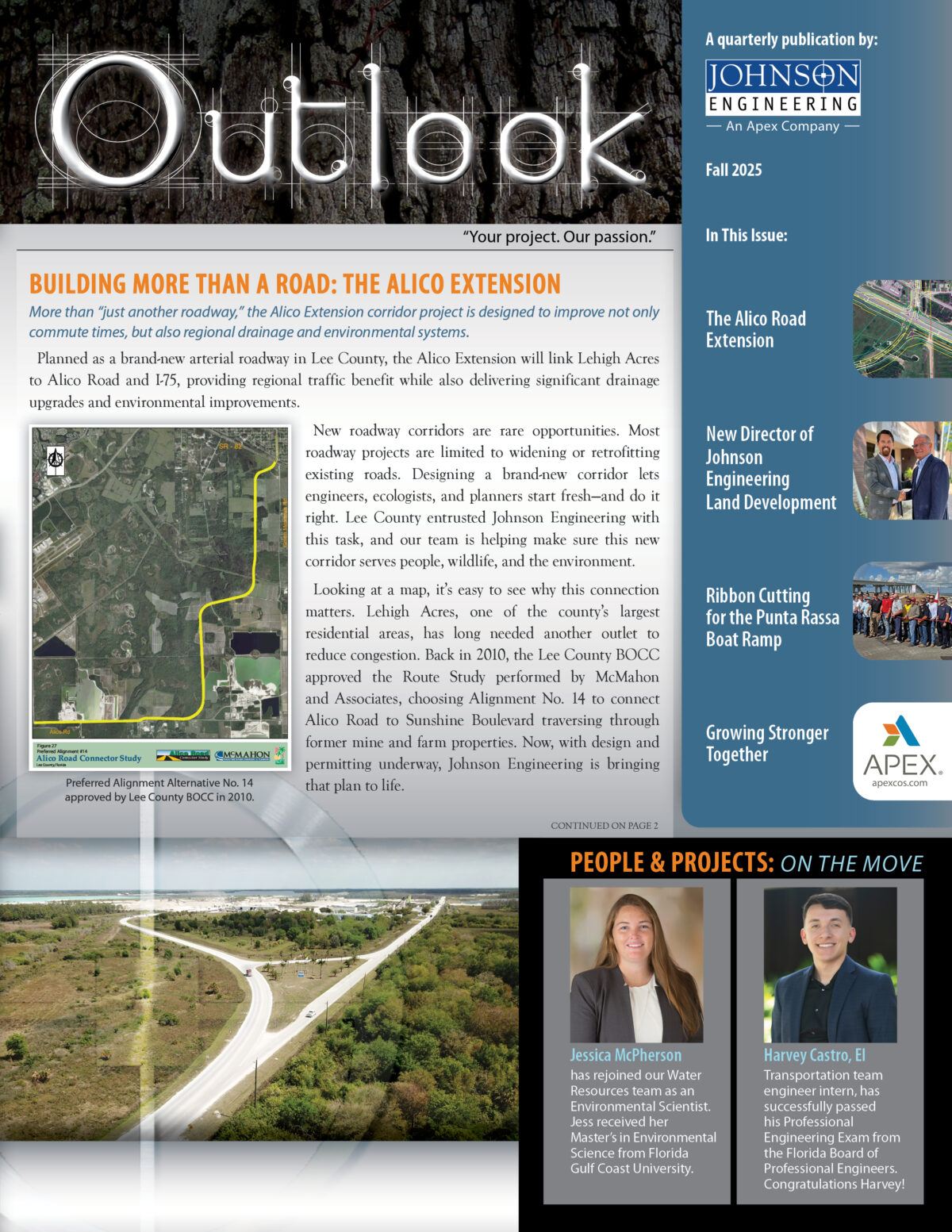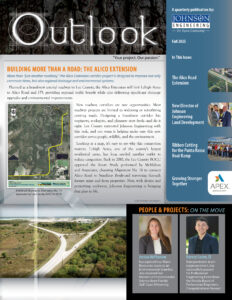More than “just another roadway,” the Alico Extension corridor project is designed to improve not only commute times, but also regional drainage and environmental systems.
Planned as a brand-new arterial roadway in Lee County, the Alico Extension will link Lehigh Acres to Alico Road and I-75, providing regional traffic benefit while also delivering significant drainage upgrades and environmental improvements.
New roadway corridors are rare opportunities. Most roadway projects are limited to widening or retrofitting existing roads. Designing a brand-new corridor lets engineers, ecologists, and planners start fresh—and do it right. Lee County entrusted Johnson Engineering with this task, and our team is helping make sure this new corridor serves people, wildlife, and the environment.
Looking at a map, it’s easy to see why this connection matters. Lehigh Acres, one of the county’s largest residential areas, has long needed another outlet to reduce congestion. Back in 2010, the Lee County BOCC approved the Route Study performed by McMahon and Associates, choosing Alignment No. 14 to connect Alico Road to Sunshine Boulevard traversing through former mine and farm properties. Now, with design and permitting underway, Johnson Engineering is bringing that plan to life.
Being intimately familiar with the area, our design team is implementing numerous improvement concepts. There are some noteworthy intersection and traffic improvements in play, but the roadway components are the easy part — the true and exciting benefits come from the innovative drainage and environmental components built into the corridor.
Drainage
The Alico Extension corridor runs generally north–south, along the east side of Wild Turkey Strand, a wetland system that drains south and crosses Alico Road through two sloughs. Over the years, development has restricted flow through the eastern slough, creating stress on surrounding neighborhoods.
The new roadway gives Lee County a chance to help. Planned improvements include:
Increased outfall capacity under Corkscrew Road.
Added flow capacity along north-south portions of Alico Road.
A new treatment pond that doubles as an emergency bypass between the eastern and western sloughs. A majority of the time it will function like a typical pond, treating roadway runoff. But during extreme events, water control structure gates can be opened to divert flow, minimizing local flooding risks downstream.
A bypass pipe into a county-owned borrow pit south of Alico Road and adjacent to the western slough will provide temporary storage during storms before releasing water back into the system.
These drainage upgrades mean reduced localized flooding, healthier wetlands, and a more resilient community.
Environmental
People aren’t the only ones crossing this corridor—wildlife depends on it as well. The project area considers impacts to wildlife such as deer, bobcats, black bears, and the Florida panther. To help minimize wildlife/vehicular collisions, the project includes five dedicated wildlife crossings plus miles of fencing, designed in partnership with state and federal agencies.
The roadway also provides a chance to undo some old environmental damage. Portions of Wild Turkey Strand were drained decades ago for farming, leaving ditches and berms that disrupted wetlands. With the Alico Extension, Lee County is funding large-scale ecological restoration:
Site 90: 556 acres, including 51 acres of wetland creation, 303 acres of wetland enhancement, 166 acres of wetland restoration and 34 acres of upland enhancement. Originally intended as a self-permittee mitigation area for the overall project, Site 90 includes wetland creation and restoration through invasive species removal and ecological enhancements to restore natural hydroperiod and habitat function. These improvements were sufficient to fully mitigate the wetland impacts from the roadway.
Site 200: 406 acres, restoring old farm fields to pre-development conditions, including proposal for approximately 142 acres of wetland creation, 123 acres of wetland enhancement and restoration, 38 acres of surface water creation and 66 acres of upland enhancement. Originally shelved due to high earthwork costs, the initiative was revived as part of the roadway project. Taking advantage of the available material and incorporating it into the roadway construction allows significant ecological restoration while saving millions in construction costs and avoiding thousands of on-road truck trips.
Together, these sites total approximately 962 acres of ecological restoration—more than 10 times the wetland impacts of the road itself.
The Alico Extension is proof that when a project is planned thoughtfully the transportation, drainage, and environmental benefits can all move forward together. It’s not “just another road” – it’s a smarter, greener way to grow.
For more information contact John Glenn, PE [email protected].


































































